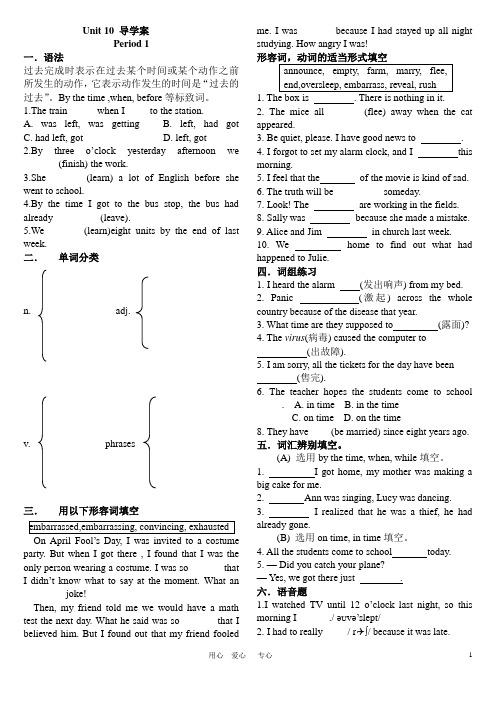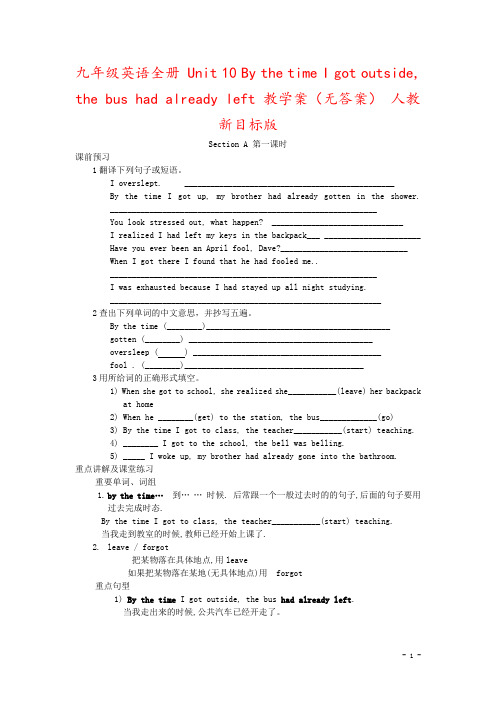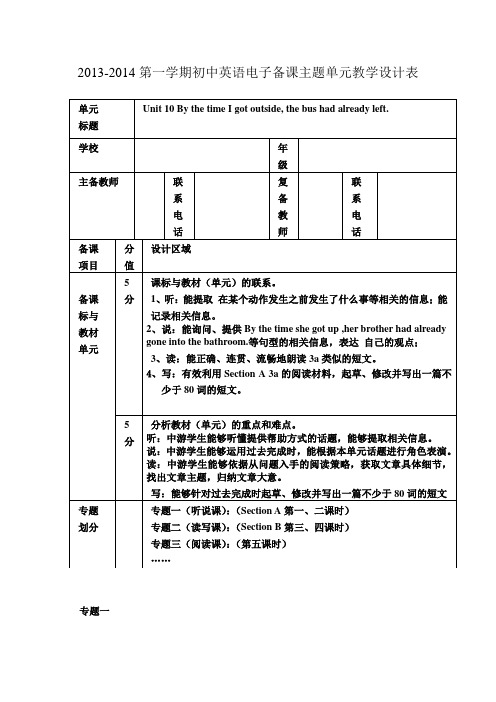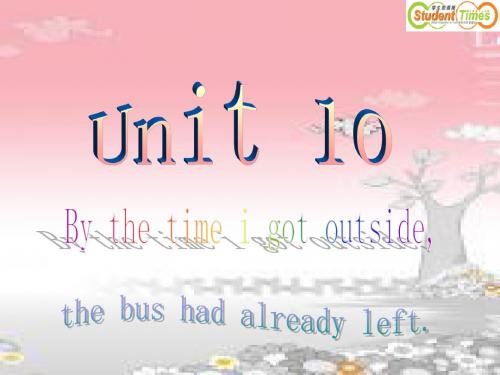Unit 10 By the time I got outside…教案
- 格式:doc
- 大小:191.00 KB
- 文档页数:20

Unit 10 导学案Period 1一.语法过去完成时表示在过去某个时间或某个动作之前所发生的动作,它表示动作发生的时间是“过去的过去”。
By the time ,when, before等标致词。
1.The train _____ when I ____ to the station.A. was left, was gettingB. left, had gotC. had left, gotD. left, got2.By three o’clock yesterday afternoon we _______(finish) the work.3.She _______(learn) a lot of English before she went to school.4.By the time I got to the bus stop, the bus had already _________(leave).5.We _______(learn)eight units by the end of last week.二.单词分类n. adj.v. phrases三.用以下形容词填空embarrassed,embarrassing, convincing, exhausted On April Fool’s Day, I was invited to a costume party. But when I got there , I found that I was the only person wearing a costume. I was so ______ that I didn’t know what to say at the moment.What an ________ joke!Then, my friend told me we would have a math test the next day. What he said was so _______that I believed him. But I found out that my friend fooled me. I was _______because I had stayed up all night studying. How angry I was!形容词,动词的适当形式填空announce, empty, farm, marry, flee,end,oversleep, embarrass, reveal, rush1. The box is . There is nothing in it.2. The mice all _______(flee) away when the cat appeared.3. Be quiet, please. I have good news to .4. I forgot to set my alarm clock, and I this morning.5. I feel that the of the movie is kind of sad.6. The truth will be _________ someday.7. Look! The are working in the fields.8. Sally was because she made a mistake.9. Alice and Jim in church last week.10. We home to find out what had happened to Julie.四.词组练习1. I heard the alarm (发出响声) from my bed.2. Panic (激起) across the whole country because of the disease that year.3. What time are they supposed to (露面)?4. The virus(病毒) caused the computer to(出故障).5. I am sorry, all the tickets for the day have been(售完).6. The teacher hopes the students come to school _____. A. in time B. in the timeC. on timeD. on the time8. They have ____(be married) since eight years ago. 五.词汇辨别填空。

Unit 10 By the time I got outside, the bus had already left. SectionB说课稿1.Knowledge Objects(1)Target LanguageBy the time she got to class,the teacher had already started teaching.When she got to school,she realized she had left her backpack at home.When I got home,I realized I had left my keys in the backpack.(2)The Three Forms of the verbs.2.Ability Objects(1)Train the students' listening skill.(2)Train the students' writing skill with the target language.(3)Train the students' speaking skill.(4)Train the students to use the three forms of the verbs.3.Moral ObjectTry to be a careful person and do everything carefully.Remember not to be as careless as Tina.Ⅱ.Teaching Key Points1.Listening practice with the target language.2.Use the correct verb forms to fill in the blanks by listening.3.Make sentences using the Past Perfect Tense.4.The three forms of the verbs.Ⅲ.Teaching Difficult Points1.Write an ending for the story in Activity 2c.2.The three verb forms in Grammar Focus.Ⅳ.Teaching Methods1.Listening2.PairworkⅤ.Teaching AidsA tape recorderⅥ.Teaching ProceduresStep Ⅰ Revision1.Revise what happened to Tina in the morning by asking one or two students to tell the stroy on page 68.They may say like this:Tina had a bad morning.First of all she overslept.By the time she got up,her brother had already gotten in the shower.And by the time she went outside,the bus had already left.She had to run all the way to school.When she got to school,she realized she had left her backpack at home.All these made her look stressed out.After that,ask the whole class to work in pairs.telling the stroy and helping each other in turns.Remind them to use the correct verb forms.2.Ask students to check each other's homework in pairs,pointing out all the mistakes they might have made.3.Revise the Past Perfect Tense by asking the children when to use it and what its verb structure is.Step Ⅱ 2aThis activity provides guided listening practice using the target language.We have known Tina had a bad morning.But something worse happened to Tina later.Let's go to Activity 2a on page 69 and see what happened to Tina later in the morning.Read the instructions to the class.Be sure that all of them know what to do.Call the students' attention to the four pictures.Get them to guess the correct orderof the pictures first.The first one is given as a sample.Ask one or two children to tell their stories by describing the pictures according to their own order.Then,we will hear Tina talking about what happened to her after she got to school.We can see there is a small box in each picture.Please write a number from 1 to 4 in each box to show each picture's correct order.The first one has been given as a sample.Get the children to get ready to listen to Tina continue her story.Play the recording the first time,students only listen.Play the recording again and ask the children to number each picture.Check the answers with the class and see who have ever got the correct answers without listening.AnswersThe pictures should be numbered in this order:3 1 2 4TapescriptBoy:So then what did you do,Tina?Girl:Well,I ran home to get my backpack.But when I got home,I realized I had left my keys in the backpack.Boy:You're kidding!Girl :So I ran back to school without my keys or my backpack.And by the time I got back to school,the bell had rung.Boy:Oh,no!Girl:And by the time I walked into class,the teacher had started teaching already.She asked for our homework,but of course I didn't have it.Step Ⅲ 2bThis activity gives students practice in understanding and writing the target language.Ask the students to read the instructions together.Point out the blanks in the sentences and the verbs in the brackets.This activity has two parts.First let's fill in the blanks with the correct verb forms.We can see some verbs in the brackets.They are the base forms of the given verbs.For example,get and got,Get is the base form of the verb.Your job is to write the correct forms of these verbs in the blanks.Look at number one.A sample answer is given.Let the students fill in the blanks with the correct forms individually.Move around the classroom collecting the common mistakes they may make.After they all finish writing,tell them to get ready to listen to the conversation and check their answers.I will play the recording again.Please check your answers and correct any mistakes you might have made while listening.Play the recording.Students listen and check their answers.Correct the answers by asking seven different students to say theirs to the class.Answers1.got home 2.realized 3.had left 4.got 5.had rung 6.walked 7.had startedStep Ⅳ 2cThis activity gives students oral practice with the target language.Ask the whole class to read the instructions together.We have a new task now.We know Tina was late for class.What do you think happened after Tina was late for class Work with a partner.Make up an ending for the story by continuing it.The beginning has been given.Get students to discuss in pairs,Complete the ending.Make sure they are talking in English.Move around the classroom,offering language support if needed.After ten minutes,ask students to stop discussing.Get some pairs of students to tell the class how they think the story ended.And let the whole class decide whose ending is the best.Tell each pair to write down their ending,or do it after class if time is not enough.Sample ending of the storyThe teacher looked at Tina and said,“Why are you late and where is your homework,Tina?”“I had a bad morning today.”Tina said sadly.“I'm sorry to hear that,but may I know what happened?”said the teacher.Then Tina told the teacher and the whole class her story.All her classmates laughed loudly after it.Some of them said,“Poor Tina!”Bob,one of Tina's classmates,stood up and said,“Well,Tina,I'd love to help you.Why not let me keep the keys for you?I would put your keys in my backpack.”Step Ⅴ Grammar FocusThis activity introduces the target language of this unit.Call students' attention to the sentences on the left.Ask four different students to read the foursentences and point out where had plus a past participle is used.Write the sentences on the blackboard.Draw a simple time line for each sentence to help students to understand the grammar focus.For example:Then get the students to look at the box.Teach students to read the three forms of each verbs first.Then ask several students to read the verbs to the class to see if they can read.Write the verbs on the blackboard.Ask the students to make sentences correctly using each form of the verbs in the box.For example:I usually get up at 6:30.I got up at 5:30 yesterday.By the time I got up,my sister had already gotten in the shower.Tell the students when we talk about the first thing that happened.We use had plus a past participle (had gotten)and when we talk about the second thing that happened,we use the simple past tense (got up).Ask some to read their sentences to the class.Ask the students to make their own lists of other verbs used in this unit.Tell them to put the lists in their notebooks using a three-column format like the one in the Look! section.The lists have to include these verbs: leave,walk,start,oversleep,ring,be.Check the answers.Some sample sentences with the three verb forms1.I got up at 6:30 every day.I got up at 6:00 yesterday.By the time I got up,my sister had already gotten in the shower.2.We usually go to school at 7:30.We went to school at 8:30 yesterday.By the time we got to the classroom,the students had gone to the chemistry lab.3.My father leaves home at 8:30.He left home at 9:30 this morning.When my father went outside,the bus had left.4.The teacher often starts teaching at 9:00.The teacher started teaching at 8:30 the day before yesterday.When Tina got to class,the teacher had already started teaching.The three forms of the verbs used in this unit:leave left leftwalk walked walkedstart started startedoversleep overslept oversleptring rang rungbe was/were beenStep Ⅵ SummarySay,In this class,we've done much listening and writing practice with target language.We've also done some oral practice in pairs.And we've discussed the Grammar Focus of this unit.Step Ⅶ Homework1.Write down the ending of Tina's story.2.Make sentences using each form of the verbs below:leave,walk,start,oversleep,ring,be3.Review the Grammar Focus.Step Ⅷ Blackboard DesignUnit 10 By the time I got outside, the bus had already left. 复习课实录T: Good afternoon, class.Ss: Good afternoon, Miss li.T: Sit down , please.Ss: Thank you.T: Today we’ll revise Unit 10. Let’s read the title twice.The teacher shows the title on the computer. The students read the title twice.T: As usual, we can work in groups and tell your partners what other things you thought according to the main points in this unit.The students work in groups and discuss. The teacher walks around the classroom to offer some help.T: Let’s stop here. Look at the screen and we begin to check the main phases.The teacher show the main phases on the computer. The students look at the phases and speak in English. The first four answer together. Then ask some individuals to ask.1.闹响2.把…忘在…3.忘记做…4.成功做到5.等待某人做某事6.让某人搭便车7.用车接8.穿衣给某人穿衣9.出席10.成百上千的11.结婚12.和某人结婚13.激起14. 熬夜15.出故障16.经过T: Now let’s read the phrases together.The students read them twice.T: So much for phrases. Let’s revise the Grammar. What tense did we learn in this unit?Ss: 过去完成时T: Let’s revise something about it.1. 构成: had +V过分2. 过去完成时态的含义:主要是表示在过去某个时间,或是动作之前已经发生或完成的动作.也就是:过去的过去.过去完成时态的用法:1、表示过去的过去,通常由when或by引导的短语或者从句做时间状语或时间状语从句①By the end of last year, I had learned about one thousand English words. (时间提示)②When I got there, they had already left. (动作提示)2、常用在宾语从句中①He told me he had already finished his homework.②I realized he had fooled me again。

九年级英语全册 Unit 10 By the time I got outside, the bus had already left 教学案(无答案)人教新目标版Section A 第一课时课前预习1翻译下列句子或短语。
I overslept. ________________________________________________By the time I got up, my brother had already gotten in the shower._____________________________________________________________You look stressed out, what happen? ______________________________I realized I had left my keys in the backpack___ ______________________Have you ever been an April fool, Dave?_____________________________When I got there I found that he had fooled me.._____________________________________________________________I was exhausted because I had stayed up all night studying.______________________________________________________________ 2查出下列单词的中文意思,并抄写五遍。
By the time (________)__________________________________________gotten (________) __________________________________________oversleep ( ) ___________________________________________fool . (________)_________________________________________ 3用所给词的正确形式填空。

2013-2014第一学期初中英语电子备课主题单元教学设计表专题一单元 标题 Unit 10 By the time I got outside, the bus had already left.学校 年级主备教师联系电话复备教师联系电话备课项目 分值 设计区域备课标与教材单元5分课标与教材(单元)的联系。
1、听:能提取 在某个动作发生之前发生了什么事等相关的信息;能记录相关信息。
2、说:能询问、提供By the time she got up ,her brother had already gone into the bathroom.等句型的相关信息,表达 自己的观点;3、读:能正确、连贯、流畅地朗读3a 类似的短文。
4、写:有效利用Section A 3a 的阅读材料,起草、修改并写出一篇不少于80词的短文。
5分 分析教材(单元)的重点和难点。
听:中游学生能够听懂提供帮助方式的话题,能够提取相关信息。
说:中游学生能够运用过去完成时,能根据本单元话题进行角色表演。
读:中游学生能够依据从问题入手的阅读策略,获取文章具体细节,找出文章主题,归纳文章大意。
写:能够针对过去完成时起草、修改并写出一篇不少于80词的短文专题划分专题一(听说课):(Section A 第一、二课时) 专题二(读写课):(Section B 第三、四课时) 专题三(阅读课):(第五课时) ……备学情15分教法或学法:教师通过幻灯片展示S、P. 让小组交流、展示、PK 、评价使学生进行流利、准确或基本三个层次的练习。
教师积极评价。
教师引起学生兴趣的切入点:通过让学生谈论自己过去曾发生的一些有趣的事情,使学生引起学生的兴趣。
学生乐于交流参与。
备教学目标5分语言知识与语言技能目标:能够理解领悟所有单词、词组的基本含义,以及某些单词在特定语境中的意义,并能正确、熟练运用重点单词、词组;能够运用所学重点词汇、重点短语、重点语言结构句型描述提供帮助方式。


Unit 10 By the time I got outside, the bus had already left重点词汇:1. gotten get的过去分词2. oversleep 睡过头、睡得过久3. rush 冲、奔4. lock锁、锁上5. relative 亲属、亲戚6. fool愚弄、欺骗7. empty空的、排空8. embarrassed尴尬的、为难的9. describe描述、描绘10. announce宣布、宣告11. exhausted精疲力竭的12. hoax骗局、玩笑13. flee逃跑、逃走14. farmer农民15. girlfriend女朋友16. marry嫁、娶17. ending结局、结尾18. convincing令人信服的、有说服力的重点词组及句型:1.______________到......时候2. go off发出响声3. ______________跑掉、迅速离开4. ______________按时5. ______________损坏、出故障6. ______________出席7. set off 激起、引起8. ______________卖完、售光9. ______________结婚10. ______________熬夜11. give somebody a ride ______________12. flee from 从......逃走13. a piece of 一片、一块日常用语:1. -Have you ever forgotten to bring your homework to school 你曾经忘记带作业去学校吗?-Yes, I have. 是的,忘记过。
2. Last Friday night, my friend invited me to watch some videos.上星期五晚上我的朋友邀请我看录像。
Unit 10 by the time I got outside. the bus had already left. 教学建议一、教学目标1.学会使用过去完成时态;2.能够谈论有关令人尴尬或令人难忘的事情;3.能够区分名词、动词和形容词。
任务一:听力1.热身练习,看图(P68),讨论What do you usually do in the morning before school?Do you get up early in the morning?Are you late for school?What happened to Tina?2.通过听力练习,帮助学生输入地道的语言材料,为提高学生口语表达能力及输出奠定基础。
任务二:阅读1.通过阅读训练,培养学生获取信息的能力,同时巩固句型和扩大词汇量2.学会欣赏,在学生获取信息的基础上,引导学生欣赏和积累优美、正确、地道的语言材料,为口语和书面表达奠定基础。
3.通过阅读,了解到西方国家愚人节发生的事情,并引导学生理智地分析所发生的事件任务三:讨论1.叙述Tina的经历,并为其经历续写结尾2.回忆并叙述我们生活中经历的尴尬事情3.回忆并叙述生活中难以忘怀的事情五、可供教师选择的任务活动Sample 1 Tina尴尬的早晨(with the help of the pictures on the book), 并为故事续写结尾。
引导学生用过去完成时态,叙述事情,注意事情发生的先后顺序,发挥想象给出一个合理的结尾。
操作建议:1.完成听力任务(1b, 2a & ab)朗读对话,加强语言输入2.同桌之间根据图示以第三人称叙述Tina的经历3.全班共同讨论故事的结尾,看谁给出的结尾更符合逻辑关系又体现人与人之间的友爱。
拓展的词汇:forgive, stationeries, habitsSample 2 谈谈上周的某天或进来的某个早晨发生的事情。
Unit 10 By the time I got outside, the bus had already left.一.学习目标(Language Goal)1.Learn to narrate past events.学会描述过去所发生的事情。
2.Learn to express something with Past Perfect Tense. 学习使用过去完成时态。
3.Strengthen the consciousness of doing things regularly.做事加强连续性,有条不紊。
二.重点词组(Key phrases)1.by the time 到…时候为止2.get outside 到外边3.get to school 到学校4.get up 起床5.get into the shower 去洗澡6.get home 到家7.start doing / to do sth 开始做某事8.be late for 迟到9.go off (闹钟)闹响10.wake up 醒来11.come out 出来,出现12.run off 迅速离开,跑掉13.on time 准时14.in time 及时15.come by (走)过来16.give sb a ride 让某人搭车17.break down 损坏,坏掉18.show up 出席,露面19.stay up 熬夜20.a costume party 一个化装舞会21.sth happen to sb 某事发生在某人身上22.so …that … 如此…以至于23.set off 出发,开始24.April Fool's Day 愚人节25.get married 结婚26.marry sb 与某人结婚27.both …and … 二者…都…28.get dressed 穿好衣服29.on the first day 在第一天三. [交际用语]1.By the time she got up, her brother had already gone into the bathroom.2.By the time she went outside, the bus had already gone3.By the time she got to class, the teacher had already started teaching.4.When she got to school, she realized she had left her backpack at home 5.Have you ever overslept?6.Have you ever been late for school?四. [重点难点释义](Language Points)1.get to 意为“到达”。
例如:When did you get there last night?你昨晚什么时候到那儿的?I get home at 7:00 every day.我每天7:00到家。
When I got to the cinema, the film had already begun.我到电影院时,电影已经开始了。
辨析:get, arrive与reach这三个词都可以用来表示“到达”,但是用法不同。
(1)get和arrive都是不及物动词,其后只能跟表示地点的副词,若是跟名词则须再加介词,即get to +地点名词,arrive in / at +地点名词(in 之后跟表示大地方的词,at之后跟表示小地方的词)。
若是只说“到达”,而不指出到达哪里,则只能用arrive。
例如:How did you get / arrive there?你怎么到那儿的?I got to / arrived in Beijing the day before yesterday.我前天到的北京。
When do you often get to / arrive at school?你经常什么时候到校?When will you arrive?你什么时候到?(2)reach为及物动词,其后既可跟名词也可跟副词。
例如:I reached Beijing the day before yesterday.我前天到的北京。
We reached here on foot.我们步行到这儿的。
2.关于get的词组小结在本单元出现大量关于get的词组,要注意背诵:get to school 到学校get into the shower 去洗澡get outside 到外边get home 到家get up 起床get married 结婚get dressed 穿好衣服get to class 到班级get bored 变得无聊get tired 变得疲劳3.I've never been late for school, but yesterday I came very close我上学从未迟到过,但是昨天差一点儿就迟到了。
(1)I've 是I have的缩写,have been late是现在完成时态,现在完成时是指一个动作或状态开始于过去,持续到现在,并可能继续下去,而且对现在产生了一定的影响,其构成是have / has+动词过去分词。
例如:I have been here since 1999.自1999年以来我就在这儿。
We have lived in Jinan for 20 years.我们已经在济南住了20年了。
She hasn't worked for 2 years.她已2年不工作了。
(2)be late for 意为“……迟到”,for为介词,所以其后须跟名词。
例如:Don't be late for the meeting.开会别迟到了。
Jim was late for school again.吉姆上学又迟到了。
Tom has been late for classes twice.汤姆上课已经迟到两次了。
(3)close在此为副词“接近地,靠近地”。
此外came very close意为“到时与迟到很接近”。
4.My alarm clock didn't go off, … 闹钟没有大响……go off 意为“爆发,大响”。
例如:Although the alarm clock went off, he didn't wake up.虽然闹钟大响,但是他还是没有醒来。
与go有关的词组还有:(1)go in for“参加”(竞赛、考试);(作为嗜好、工作)“爱好”。
例如:She goes in for bird-watching.她爱好赏鸟。
(2)go on“进行,继续”。
例如:Please go on.请继续。
(3)go on doing sth 或go on with sth“继续做……”。
例如:He went on working without having a rest.他一直工作,没停下来休息过。
(4)go over“调查,视察;越过”。
例如:You must go over your lessons before the exam.考试前你必须复习。
5.…and I had to wait for him to come out.……我不得不等他出来。
(1)have to 意为“必须,不得不”。
例如:Do you have to take the test?你必须考试吗?Tom has to practice speaking Chinese every day.汤姆每天必须练习讲汉语。
辨析:have to 与must这两个词都可以表示“必须”。
have to 更加强调客观原因,而must则强调主观原因;含有have to 的句子在作句型转换时须借助于助动词do,does或did,而must本身是情态动词,进行句型转换时可以直接通过must改变。
例如:It is raining, we have to stay at home.天在下雨,我们不得不待在家里。
We must work hard.我们必须努力工作。
Lucy doesn't have to stand.露茜不必站着。
You mustn't play in the street.你不能在街道上玩。
(2)wait 是不及物动词“等待,等候”的意思。
可以用于词组wait for sb.“等某人”,wait to do sth.“等着做某事”,wait for sb to do sth.“等某人做某事”。
例如:Who are you waiting for?你在等谁?They can't wait to open the presents.他们迫不及待地打开礼物。
You can wait for him to help you.你可以等着他帮你。
6.Unfortunately, by the time I got there, the bus had already left.不幸的是,我到那儿的时候,公交车已经走了。
unfortunately 是副词“不幸地”,是由fortunately加否定前缀“un”构成的。
英语中有一部分词在词首或词尾加上前缀或后缀就可以变成另外一个词。
如:lucky (幸运的)-unlucky(不幸的),use(用)-useful(有用的),forget(忘记)-forgetful(健忘的),un作前缀表示“not”的含义,即“un”是一个否定前缀。
例如:fit(合适的)-unfit(不合适的),fair (公平的)-unfair(不公平的),known(闻名的)-unknown(不闻名的)等。
7.Luckily, my friend Tony and his Dad came by in his Dad's car and they gave me a ride.幸运的是,我的朋友托尼和他爸爸坐着他爸爸的车经过,他们让我搭了个便车。
(1)come by 意为“经过,走过;获得,获有”。
例如:Please let the car come by.请让车过去。
Good jobs are not easy to come by.好工作不容易找到。
与come有关的其他词组:<1>come out”出来;开花;出版”。
例如:The moon has come out.月亮出来了。
It's too cold for the flowers to come out.天太冷了,花不开了。